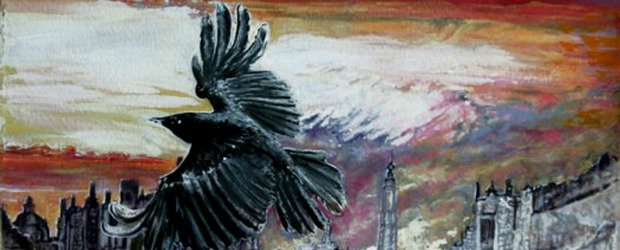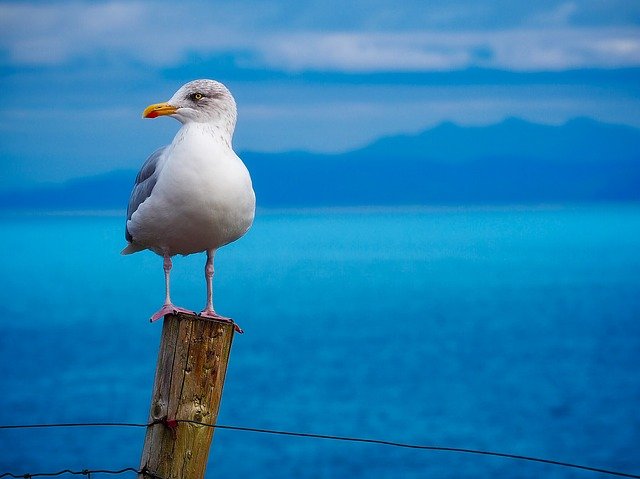You have no items in your cart. Want to get some nice things?
Go shopping
We are made up of the ghosts of moments, I believe. We clutch them to us and steal parts of them to make ourselves more whole. Each action is made up of thousands of others already gone; the result of a hundred different moments converging to create a new one, cresting on a wave of tiny hauntings. My own ghosts are not malicious ones, but neither are they kindly. They behave exactly how they did in life. Some are unimportant – the ghost of a shower once taken in a 3-star hotel room, a brief conversation about nothing, the honking of a car horn as I sat too slow at the lights – but some lurk with intensity; the ghost of a relationship, an idea, a single moment.
When I was very young, my grand-aunt would tell us old stories, of Badhbh, the crow-goddess, omen of chaos and death; of Queen Medb and her pride and the battle for the Tain; the De Danann, that ancient and kingly race; of Fionn MacCumhaill and his lost son Oisin, and all those others that float blearily from the past up to the surface of the present, remembered only in the words and songs of those who care to listen. We would sit around her as she rocked on her knees and addressed her words to the sky, because she had no fondness for children and preferred to imagine that we weren’t there. We had no fondness for her either; her dark clothes and dark words had no place in our Technicolor world of cartoons and penny-sweets and pin-striped leggings, but we listened all the same. On kinder days, I think that we found some intrinsic pity in us, young as we were, for a lonely old woman; a square peg in a world that was rapidly becoming circular, and softer. [private]
And so, when I was still young, I saw that the trees outside my home were crinkled, like wrapping paper. Their branches would frighten me, black and twisted and straining sky-wards in supplication. Dozens of crows would perch on the highest branches, in twos and threes and entire murders, screaming derision down on us. Often, as if in response to some silent signal, they would take flight in flocks, wheeling around in a giant circle before settling in a tree that looked no different to the rest; furious, terrible.
Our home was built at the end of a road, in a slightly sloping valley, over an ancient forest-bed, and was surrounded by these wrapping-paper trees. Centuries ago, men had come and dug out the roots and the trees and laid down soil and bricks and iron. The houses and lives around us had changed, grown, shrank, disappeared and was rebuilt, but still the land was kept in order under the harsh grey concrete. Sometimes the trees had tried to come creeping back in, spreading a toe or two across the boundaries, but they had kept them in line with biting axes. And we were safe.
But the woods had a champion. A monstrous hooded crow, as long as a man’s forearm. It seemed a thousand years old and one, that crow, and was Badhbh herself come to life. Every morning the crow would come with the rising sun to dash its head against our window panes. It would perch on a rafter, and beat against the glass with its beak and skull, tap-tap-tap. If we chased it away, it would sit on the telephone wires and caw at us, always taunting, and would be back on its crusade as soon as the door was closed. Even as a child, I knew it was trying to break down the house. Make it crumble to dust, piece by piece until the earth could reclaim what was hers, until chaos returned and no trace of our presence was left, and the trees could return.
***
I lost myself in the woods, once, while we were mushroom-picking. My father was the only one allowed to pull the white foamy growth from the earth, because he knew which ones were tasty and which ones were deadly, but he took us along with him for our sharp eyes. I was the best, or so I liked to believe, but now I am sure that my father left many of the mushrooms untouched so that we could make our own little discoveries and glory in it. On a soft autumn day like that, getting lost was almost intentional. I wandered far from the others and once I had left them behind and the wood-sounds of leaves and creaks had replaced their voices, I only let myself panic ever so slightly, for the look of the thing, but the truth was I felt quite adventurous and was smug in my peril. I circled back, taking my time, to where I had come from, only to find that the path had closed itself behind me, and I could not see the brighter light that signified the distant glow of clear sunlight.
I had left my father’s calls far behind, but now I raised my voice. I called for them all in turn, for Alice and Colm and Glen, and even for Clinton, the white terrier that I hated. There was no echo; the trees simply swallowed my words whole with not even a belch to prove they had ever existed.
The trees were mostly alders, although there were some ghostly birches and stern oaks scattered through. They bowed kindly to me as I passed by, and I touched their low-hanging leaves and felt that it was good. It was late autumn, and the blackberries were almost over-ripe, but I gorged on them, even as they burst between my fingers. The entire floor was slightly slanted, not enough for me to fall, but enough to turn my gait into a shuffling, one-sided stumble. The roots were often bared by the shifting earths during the spring and autumn rains. I climbed a tree and slept, then, for a time, in a hollow armpit of a branch, wedged uncomfortably but still slipping into that easy sleep that only the very young and very old can find.
When I woke, it was full dark, and no longer did my forest seem so kindly. I slipped in my fright, lost my balance and slid six long feet to the earth, scratching my knees and tearing my palms and gasping with pain. Startled, a murder of resting crows leaped to the air from the surrounding trees, and set to caw-caw, caw-cawing. I screamed back at them, reflexively baring my teeth and trying to dig my back into the roots of the tree, and as I looked around, through the blues and greys and greens and browns of night, I found terror.
In the dark, the woods were full of terrible and wasted shapes. Some were my grandfather, reaching out to plant snuffling and unwelcome kisses on my brow, limbs gaunt and swollen with the cancer that had been eating him even then. He was to die just a few months later, but even in his coffin, with his cheeks dressed with rouge and tie straightened, I would see only those strange and grasping woods and hear only the hacking sounds of the crows. Others made angle and lines that I knew to be impossible, twisted the world out of its everyday shape, cracked it out of its comfortable shell, letting logic’s anchor drag loose.
I ran, and I left the crows behind, but my flight roused others and I saw in my mind their beaks and claws swooping above me, waiting for their chance to make slivers out of my soft, pink flesh. Through trees that swept at my face, roots that caught at my feet. The narrow pathways that had earlier seemed so graceful were converging, closing in. I caught flashes of colour, of light; where the canopy opened up to the night, but as soon as I was upon them I was gone, no direction in mind except away, and always, the caw-cawing of the crows.
And then, one, screaming louder than the rest. The crow, the giant hooded bird that was the champion of the woods had found me. The lord of this domain, and furious at my trespass, he slashed at me with light and noise and terror, drove me silently to the ground and beat at me with his wings, tap-tapping with his beak, trying to break me as he sought to break the house, to return all to dust and chaos and silence.
I have no memory after that, only the words of others that have told it again and again to the smiles of others. “Oh her father brought her home, alright. He walked those woods for hours, even though you wouldn’t think there was an hour’s walk in them! Took the flashlight from the neighbours and spent an age shouting for her. Hurt? Of course not. A few scratches from climbing trees, but she was as still as a stone when he found her, not even shouting or crying. The crows knew where she was, you see, and they were cawing fit to wake the dead. Her poor father had to carry her the whole way home.” And then laughter, and the clinking of wine glasses, and the beginning of some other tale about a wayward child, or a story completely unrelated but offered up solely to draw the attention to the speaker.
***
And then, after that, there were days, only days, one after the other, falling dutifully in line. I grew up. I went to school. I got my period. I fell in love. I left, for a time, and saw the world, then came back. I settled down. I had a son. Then lost him again. My mother died. I stopped growing. I had a daughter. I moved home to the house in the gently sloping valley. I stopped growing. Nothing but days and days and days.
Somewhere within this time, I must have got on with the process of living, of building relationships like paper planes, creating hopes and failures and despairs. But these things happened on top, floating like corks. On the surface, where people swirl together and live and die. They never touched the deep. The deep was where the terror was. The terror was the tap-tap-tap of the crow, come to destroy and bring all to nothing.
But the day the trees came down is etched as firmly as the birth of my children. I suppose that makes me a grotesquery of a mother, but it is true. After years of planning, yellow leaflets and memos, the woods were finally to go, to be replaced with a motorway that linked the city nearby to a town that had no interest in being so linked. My mother was recently in her grave, but my then-elderly father had written to the local paper, and the County Council, and had shouted at any who would listen. But still the men came with yellow, growling beasts and whirring saws and cut the trees down to make way for the flowing river of concrete and yellow and white lines that had was to be laid down. I watched it happen and saw that the city was a volcano; it spewed out steel and stop signs and buildings that cut off the sky. But I was pleased, because I believed that when the trees were taken away, and the crow was banished, those ghosts would be laid to rest and I would be safe.
***
And now I am alone, in the house surrounded by greys and blacks and straight lines that pull the eye to the corners of the horizon, and the city has grown up and can almost reach out and touch me. I am home, in the house in the gently sloping valley, but still I am made up of the ghosts that have gone before. The woods are gone, and yet I still see their touch everywhere, and so I search for angles, lines, and order. I long for glass buildings, metal grates, dirty gutters. I want junctions that criss and cross and cross again; traffic lights that run on timers. I want all these things to keep the terror away, and to bury the crow and the woods deep, deep down, send them flowing back into the seams of black, black dread that should never be plumbed. [/private]

About Sheila Armstrong
Sheila Armstrong grew up in the west of Ireland and now lives in Dublin. She is 25 years old and works as a freelance editor. She has been shortlisted for several awards and has been published in various journals. She is currently writing her first collection of short stories.




